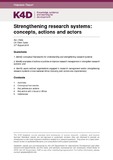| dc.contributor.author | Datta, Ajoy | |
| dc.date.accessioned | 2018-09-20T10:48:04Z | |
| dc.date.available | 2018-09-20T10:48:04Z | |
| dc.date.issued | 2018-08-31 | |
| dc.identifier.citation | Datta, A. (2018) Strengthening Research Systems: Concepts, Actions and Actors, K4D Helpdesk Report. Brighton, UK: Institute of Development Studies | en |
| dc.identifier.uri | https://opendocs.ids.ac.uk/opendocs/handle/20.500.12413/14062 | |
| dc.description.abstract | There are few frameworks that explicitly conceptualise social science research systems in a ‘developing’ country context. What frameworks there are tend to focus on health and agriculture. However, drawing on related or tangential bodies of knowledge, one comes across frameworks which conceptualise, for instance, innovation, mainly in a ‘developed’ country context as well as knowledge systems in both ‘developing’ and ‘developed’ country contexts. In fact there is a considerable body of literature exploring knowledge systems, which due to time constraints was not assessed in any depth. Nevertheless, these and other frameworks all provide important lessons for conceptualising research systems in a developing country context, especially those in sub-Saharan Africa. Key lessons include that the interaction between (knowledge) actors in a system is as important for processes and outcomes as the actors themselves; that development is driven, not by research, scientific or technological change, but by the institutional (and political) context in which (social and natural) scientific and technological change occurs; and that formal research institutes only produce a fraction of the knowledge that society needs to grow and develop.
Most actions that provide research capacity strengthening in a ‘developing’ country context tend to happen in the health and agricultural sectors. In addition, in those sectors, only a fraction of actions support improvements to the broad research system or environment. Amongst these, support to strengthening research systems is delivered mainly through three modalities: 1) centres of excellence, 2) north-south partnerships and 3) networks and consortia. The actions taken by funding and implementing actors to strengthen research systems (which were surveyed, mostly in Anglophone sub-Saharan Africa) can broadly be grouped into the following categories: 1) generating and sharing knowledge about research systems and their evolution; 2) priority setting and financing; 3) governance and regulation; 4) managing and coordinating research; 5) research leaders and centres of excellence; 6) strengthening ties and connections between stakeholder groups; and 7) support to female researchers and gender mainstreaming. | en |
| dc.language.iso | en | en |
| dc.publisher | IDS | en |
| dc.relation.ispartofseries | K4D Helpdesk Reports;429-430 | |
| dc.rights.uri | https://www.nationalarchives.gov.uk/doc/open-government-licence/version/3/ | en |
| dc.subject | Science and Society | en |
| dc.title | Strengthening Research Systems: Concepts, Actions and Actors | en |
| dc.type | Other | en |
| dc.rights.holder | UK Government | en |
| dcterms.dateAccepted | 2018-08-31 | |
| rioxxterms.funder | Department for International Development, UK Government | en |
| rioxxterms.identifier.project | K4D | en |
| rioxxterms.version | VoR | en |
| rioxxterms.funder.project | 238a9fa4-fe4a-4380-996b-995f33607ba0 | en |

